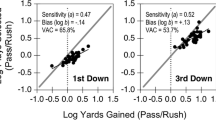Abstract
Any competitive process selects among qualities possessed by the competitors, and with different processes selecting for different qualities. While the competitive form is universal, the substantive qualities that are selected depend on the particular environment within which competition occurs. With respect to athletic competition, for instance, diving selects for different qualities than swimming: a champion diver need not be a champion swimmer. Markets and politics are both forms of competitive endeavor, and it is reasonable to think that competition will select for excellence within each environment. This purely formal property of competition, however, generates different substantive qualities across environments, as we explore in this paper.
Similar content being viewed by others
Notes
The qualifier “identifiable” means that there is no specific person whose permission is required. With market competition, an enterprise will go forward only if the entrepreneur is able to attract sufficient backing to hire the inputs necessary to operate the enterprise. If one supplier rejects an overture from the entrepreneur, other candidates can be approached because there is no specific person or office whose permission must be obtained.
References
Alchian, A. A. (1950). Uncertainty, evolution, and economic theory. Journal of Political Economy, 58, 211–221.
Alford, J. R., & Hibbing, J. R. (2004). The origin of politics: an evolutionary theory of political behavior. Perspectives on Politics, 2, 707–723.
Becker, G. S. (1983). A theory of competition among pressure groups for political influence. Quarterly Journal of Economics, 98, 371–400.
Besley, T. (2006). Principled agents? The political economy of good government. Oxford: Oxford University Press.
Buchanan, J. M. (1954). Individual choice in voting and the market. Journal of Political Economy, 62, 334–343.
Darby, M., & Karni, E. (1973). Free competition and the optimal amount of fraud. The Journal of Law & Economics, 16, 67–88.
Ellsberg, D. (1956). The theory of the reluctant duelist. The American Economic Review, 46, 909–923.
Emons, W. (1997). Credence goods and fraudulent experts. The Rand Journal of Economics, 28, 107–119.
Epstein, J. M. (Ed.) (2006). Generative social science: studies in agent-based computational modeling. Princeton: Princeton University Press.
Gigerenzer, G. (2008). Rationality for mortals. Oxford: Oxford University Press.
Kirzner, I. (1973). Competition and entrepreneurship. Chicago: University of Chicago Press.
Kirzner, I. (1979). Perception, opportunity, and profit. Chicago: University of Chicago Press.
Ostrom, V. (1997). The meaning of democracy and the vulnerability of societies: a response to Tocqueville’s challenge. Ann Arbor: University of Michigan Press.
Pareto, V. (1935). The mind and society. New York: Harcourt Brace.
Persson, T., & Tabellini, G. (2000). Political economics: explaining economic policy. Cambridge: MIT Press.
Podemska-Mikluch, M., & Wagner, R. E. (2012). Dyads, triads, and the theory of exchange: between liberty and coercion. The Review of Austrian Economics. doi:10.1007/s11138-012-0180-x.
Potts, J. (2000). The new evolutionary microeconomics: complexity, competence, and adaptive behavior. Cheltenham: Edward Elgar.
Rosser, J. B. (forthcoming). Emergent self-organization versus natural selection in evolutionary political economy. Advances in Austrian Economics.
Rubin, P. H. (2002). Darwinian politics. New Brunswick: Rutgers University Press.
Sachs, J. (2012). Today’s challenges go beyond Keynes. Financial Times. http://www.ft.com/intl/cms/s/0/369d77da-483f-11e2-a1c0-00144feab49a.html. Accessed December 20, 2012.
Taleb, N. N. (2012). Antifragile: things that gain from disorder. New York: Random House.
Tocqueville, A. (1966 [1835–1840]). Democracy in America. New Rochelle: Arlington House.
Tononi, G., Sporns, O., & Edelman, G. M. (1999). Measures of degeneracy and redundancy in biological networks. Proceedings of the National Academy of Sciences of the United States of America, 96, 3257–3262.
Usher, D. (2012a). Bargaining unexplained. Public Choice, 151, 23–41.
Usher, D. (2012b). Bargaining and voting. Public Choice, 151, 739–755.
Wagner, R. E. (2007). Fiscal sociology and the theory of public finance. Cheltenham: Edward Elgar.
Wagner, R. E. (2012). Deficits, debt, and democracy. Cheltenham: Edward Elgar.
Wittman, D. (1989). Why democracies produce efficient results. Journal of Political Economy, 97, 1395–1424.
Wittman, D. (1995). The myth of democratic failure. Chicago: University of Chicago Press.
Acknowledgements
We are grateful to two referees and the editor for numerous comments and suggestions that allowed us to clarify what on hindsight we realize was an unduly muddled exposition. We are also grateful to Barkley Rosser for several helpful comments when we presented an earlier version of this paper at the November 2012 meetings of the Southern Economic Association.
Author information
Authors and Affiliations
Corresponding author
Rights and permissions
About this article
Cite this article
Wagner, R.E., Yazigi, D. Form vs. substance in selection through competition: elections, markets, and political economy. Public Choice 159, 503–514 (2014). https://doi.org/10.1007/s11127-013-0065-y
Received:
Accepted:
Published:
Issue Date:
DOI: https://doi.org/10.1007/s11127-013-0065-y
Keywords
- Formal vs. substantive rationality
- Selection of qualities
- Competitive selection
- Markets vs. elections
- Environmental rationality
- Ecological rationality
- Generative analysis
- Evolutionary political economy




